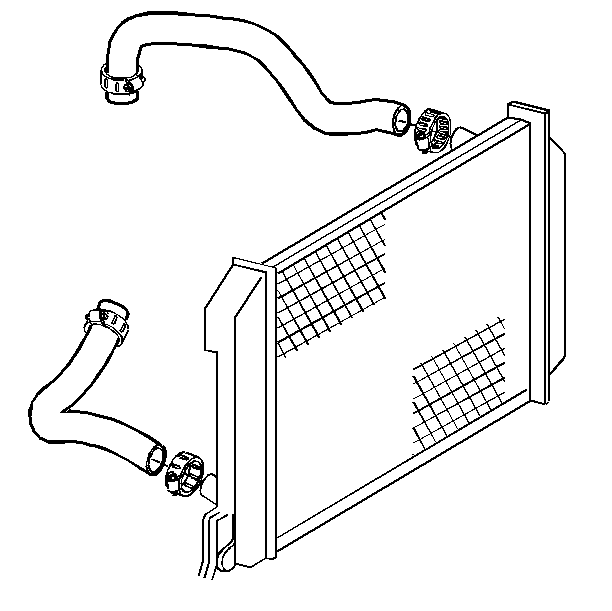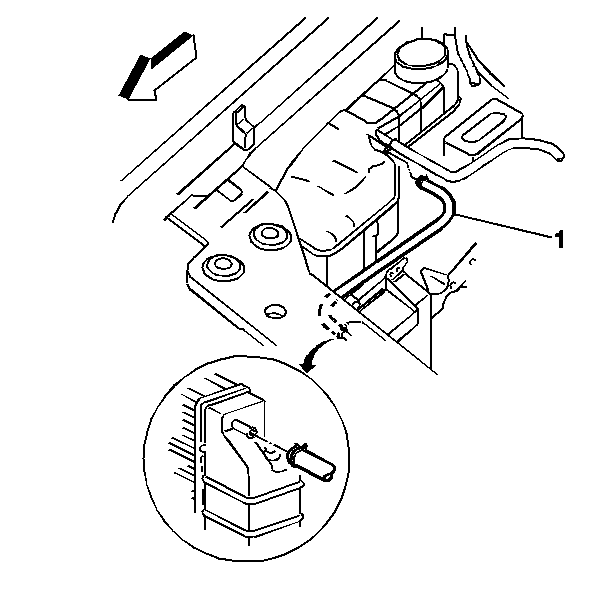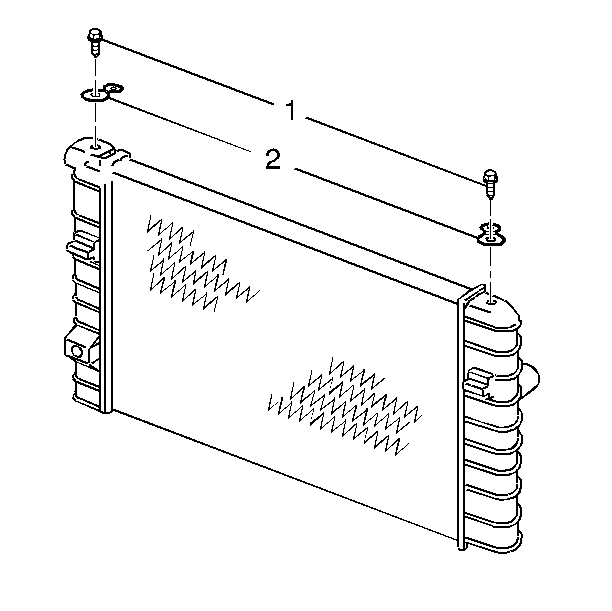Removal Procedure
- Disconnect the negative battery cable. Refer to
Caution: Unless directed otherwise, the ignition and start switch must be in the OFF or LOCK position, and all electrical loads must be OFF before servicing any electrical component. Disconnect the negative battery cable to prevent an electrical spark should a tool or equipment come in contact with an exposed electrical terminal. Failure to follow these precautions may result in personal injury and/or damage to the vehicle or its components.
in General Information. - Drain the cooling system. Recover the coolant. Refer to Cooling System Draining and Filling .
- Remove the air intake duct assembly. Refer to Air Intake Replacement in Engine Controls.
- Disconnect the upper transaxle oil cooler line from the radiator (Automatic Transmission).
- Disconnect the radiator inlet hose and the clamp from the radiator.
- Raise the vehicle. Refer to General Information.
- Disconnect the lower transaxle oil cooler line from the radiator.
- Remove the cooling fan. Refer to Electric Cooling Fan .
- Remove the splash shield that is below the radiator outlet hose. Refer to Body Front End in Body Service.
- Disconnect the radiator outlet hose from the radiator.
- Lower the vehicle.
- Remove the retaining clip from the condenser line. Refer to Heating and Air Conditioning.
- Remove the condenser to radiator bolts. Refer to Heating and Air Conditioning.
- Disconnect the surge tank inlet hose and the clamp from the radiator.
- Remove the radiator retaining bolts and the mounts.
- Remove the radiator.
Notice: When adding coolant, use DEX-COOL® coolant. If silicated coolant is added to the system, premature engine, heater core or radiator corrosion may result. In addition, the engine coolant will require change sooner-at 50 000 km (30,000 mi) or 24 months.

| 8.1. | Disconnect the cooling fan electrical connector. |
| 8.2. | Remove the fan retaining bolt. |



Installation Procedure
- Install the radiator
- Install the radiator mounts and the bolts.
- Connect the surge tank inlet hose and the clamp to the radiator.
- Install the radiator to condenser bolts. Install the retaining clip to the condenser line. Refer to Heating and Air Conditioning.
- Raise the vehicle.
- Connect the radiator outlet hose and the clamp to the radiator.
- Install the splash shield that is below the radiator outlet hose.
- Install the cooling fan.
- Connect the lower transaxle oil cooler line to the radiator (Automatic Transmission).
- Lower the vehicle.
- Connect the radiator inlet hose and the clamp to the radiator.
- Connect the upper transaxle oil cooler line to the radiator (Automatic Transmission).
- Connect the air intake duct assembly. Refer to Air Intake Replacement in Engine Controls.
- Fill the cooling system. Refer to Cooling System Draining and Filling .
- Connect the negative battery cable.
- START the engine. Check for coolant leaks.

Tighten
Tighten the bolts to 10 N·m (89 lb in).
Notice: Use the correct fastener in the correct location. Replacement fasteners must be the correct part number for that application. Fasteners requiring replacement or fasteners requiring the use of thread locking compound or sealant are identified in the service procedure. Do not use paints, lubricants, or corrosion inhibitors on fasteners or fastener joint surfaces unless specified. These coatings affect fastener torque and joint clamping force and may damage the fastener. Use the correct tightening sequence and specifications when installing fasteners in order to avoid damage to parts and systems.


| 8.1. | Install the cooling fan retaining bolt. |
| 8.2. | Connect the cooling fan electrical connector. |
Tighten
Tighten the transaxle oil cooler line fitting to 30 N·m
(22 lb ft).

Tighten
Tighten the transaxle oil cooler line fitting to 30 N·m
(22 lb ft).
Tighten
Tighten the negative battery cable bolt to 15 N·m (11 lb ft).
